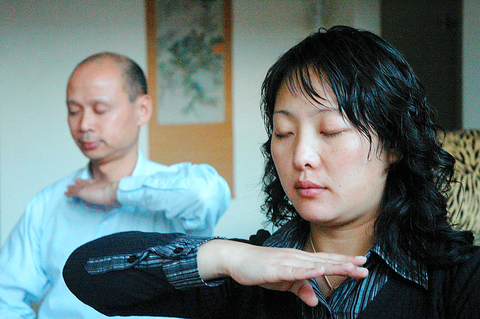Australia has granted a protection visa to a former Chinese policeman who claims to have information on the torture and abuse of dissidents in China, his lawyer said yesterday.
Hao Fengjun (郝鳳軍), 32, received the visa last week, a day after testifying at a Senate inquiry into the government's handling of another high-profile Chinese defector, lawyer Bernard Collaery said.
Hao claims to have worked for a Chinese security department known as the 610 Office, where his job was to handle reports from overseas informants spying on pro-democracy activists and followers of the Falun Gong meditation movement. He arrived in Australia in February as a tourist and subsequently sought asylum, saying he had brought secret documents detailing the torture and abuse by Chinese authorities of Falun Gong practitioners. His case became public after a first secretary at China's consulate in Sydney, Chen Yonglin (陳用林), quit his post and demanded political asylum in May, asserting that China had up to 1,000 spies operating in Australia.

PHOTO: EPA
After initially refusing the request, the government granted Chen, 37, a protection visa early last month. Both Hao and Chen testified last week to a Senate committee looking into the government's handling of Chen's initial asylum request. Collaery told the same inquiry that immigration officials ignored Hao for months and only interviewed the former policeman early last month after he went public with his claims about abuse of Falun Gong members.
Yesterday, Collaery suggested his client finally received a protection visa allowing him to remain in Australia only because of the publicity surrounding last week's Senate hearings.
"It took that kind of pressure ... to get protection in our country," he was quoted as saying by the Australian Associated Press.
Collaery spoke as Hao attended a protest by about 80 Falun Gong followers near a Canberra court that was hearing a complaint by the movement against Foreign Minister Alexander Downer.
Their suit claims Downer's department unfairly curbs freedom of expression by imposing restrictions on protest demonstrations outside the Chinese embassy in Canberra.

James Watson — the Nobel laureate co-credited with the pivotal discovery of DNA’s double-helix structure, but whose career was later tainted by his repeated racist remarks — has died, his former lab said on Friday. He was 97. The eminent biologist died on Thursday in hospice care on Long Island in New York, announced the Cold Spring Harbor Laboratory, where he was based for much of his career. Watson became among the 20th century’s most storied scientists for his 1953 breakthrough discovery of the double helix with researcher partner Francis Crick. Along with Crick and Maurice Wilkins, he shared the

OUTRAGE: The former strongman was accused of corruption and responsibility for the killings of hundreds of thousands of political opponents during his time in office Indonesia yesterday awarded the title of national hero to late president Suharto, provoking outrage from rights groups who said the move was an attempt to whitewash decades of human rights abuses and corruption that took place during his 32 years in power. Suharto was a US ally during the Cold War who presided over decades of authoritarian rule, during which up to 1 million political opponents were killed, until he was toppled by protests in 1998. He was one of 10 people recognized by Indonesian President Prabowo Subianto in a televised ceremony held at the presidential palace in Jakarta to mark National

US President Donald Trump handed Hungarian Prime Minister Viktor Orban a one-year exemption from sanctions for buying Russian oil and gas after the close right-wing allies held a chummy White House meeting on Friday. Trump slapped sanctions on Moscow’s two largest oil companies last month after losing patience with Russian President Vladimir Putin over his refusal to end the nearly four-year-old invasion of Ukraine. However, while Trump has pushed other European countries to stop buying oil that he says funds Moscow’s war machine, Orban used his first trip to the White House since Trump’s return to power to push for

LANDMARK: After first meeting Trump in Riyadh in May, al-Sharaa’s visit to the White House today would be the first by a Syrian leader since the country’s independence Syrian President Ahmed al-Sharaa arrived in the US on Saturday for a landmark official visit, his country’s state news agency SANA reported, a day after Washington removed him from a terrorism blacklist. Sharaa, whose rebel forces ousted long-time former Syrian president Bashar al-Assad late last year, is due to meet US President Donald Trump at the White House today. It is the first such visit by a Syrian president since the country’s independence in 1946, according to analysts. The interim leader met Trump for the first time in Riyadh during the US president’s regional tour in May. US envoy to Syria Tom Barrack earlier